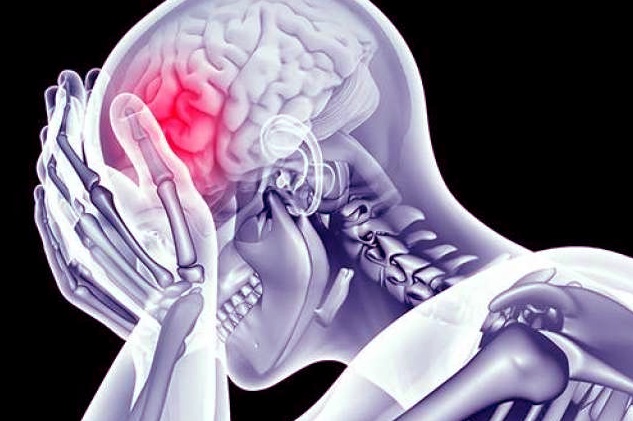Nikhil Prasad Fact checked by:Thailand Medical News Team Aug 04, 2025 6 months, 3 weeks, 23 minutes ago
Medical News: COVID-19 brain damage linked to long-term trauma and fatigue
A new Chinese and American study has found that individuals who experience fatigue during the early stages of COVID-19 are more likely to develop post-traumatic stress symptoms (PTSS) months later, due to disruptions in their brain's functional networks. Researchers from the First Affiliated Hospital of Xi'an Jiaotong University, Xidian University, the University of South China, GE Healthcare MR Research Beijing, and the Medical College of Wisconsin used brain imaging and clinical assessments to uncover how COVID-related fatigue in the acute phase affects long-term mental health outcomes.
 COVID-19 Fatigue Damages Brain Networks and Triggers PTSD Symptoms
COVID-19 Fatigue Damages Brain Networks and Triggers PTSD Symptoms
In this
Medical News report, scientists analyzed brain scans and mental health assessments from 153 COVID-19 patients during the acute phase of their illness and followed up with 106 of them three months later. They discovered that COVID-19 causes disruptions in the brain’s communication networks, especially among those reporting fatigue early on. These disruptions were linked to higher risks of PTSS, including hyperarousal, anxiety, and intrusive memories.
How COVID-19 disrupts the brain’s internal wiring
The study focused on a brain network property called “normalized characteristic path length,” which helps measure how efficiently different regions of the brain communicate. In COVID-19 patients, especially those suffering from fatigue, this path length was significantly reduced. This means their brain networks were overactive and less efficient—similar to patterns seen in people with post-traumatic stress disorder.
The researchers also found that one specific brain region, the right inferior frontal gyrus, showed unusually high activity in fatigued patients. This region is involved in emotional regulation and decision-making. The stronger its activity, the more severe the patients' fatigue and PTSS symptoms were. In contrast, another brain region involved in emotional awareness—the left insular cortex—was less active, further hinting at dysregulated stress processing in the brain.
Fatigue is not just tiredness—it’s a brain warning sign
One of the most alarming findings was that fatigue during the acute phase of COVID-19 acted as a full mediator in the development of hyperarousal symptoms three months later. In simpler terms, patients who were physically exhausted during their infection were far more likely to experience chronic PTSD-like symptoms later on.
Importantly, while fatigue symptoms appeared to decrease over time, PTSS symptoms did not. In fact, they persisted at the same or even higher levels during follow-up, suggesting long-lasting brain and emotional trauma even in those who had only mild COVID-19 symptoms.
What this means for recovery and future research
The researchers stress that monitoring early fatigue in COVID
-19 patients could help identify those at higher risk of long-term psychological issues. Their findings point to the need for early mental health support and possibly brain-based therapies. The study highlights how even a mild infection can cause measurable changes in brain connectivity that continue to affect a person’s mental health months after recovery.
The study findings were published in the peer reviewed journal: Neuroscience (Elsevier)
https://www.sciencedirect.com/science/article/pii/S0306452225008127
For the latest COVID-19 news, keep on logging to Thailand
Medical News.
Read Also:
https://www.thailandmedical.news/news/alarming-rise-in-brain-degeneration-risks-after-covid-19-infection-sparks-global-medical-alert
https://www.thailandmedical.news/news/study-finds-that-covid-19-alters-brain-function-by-disrupting-alternative-polyadenylation
https://www.thailandmedical.news/news/sars-cov-2-spike-protein-detected-in-brain-arteries-of-43-8-percent-of-vaccinated-individuals-even-17-months-after-mrna-vaccination
